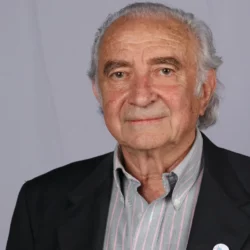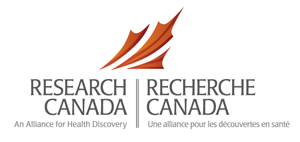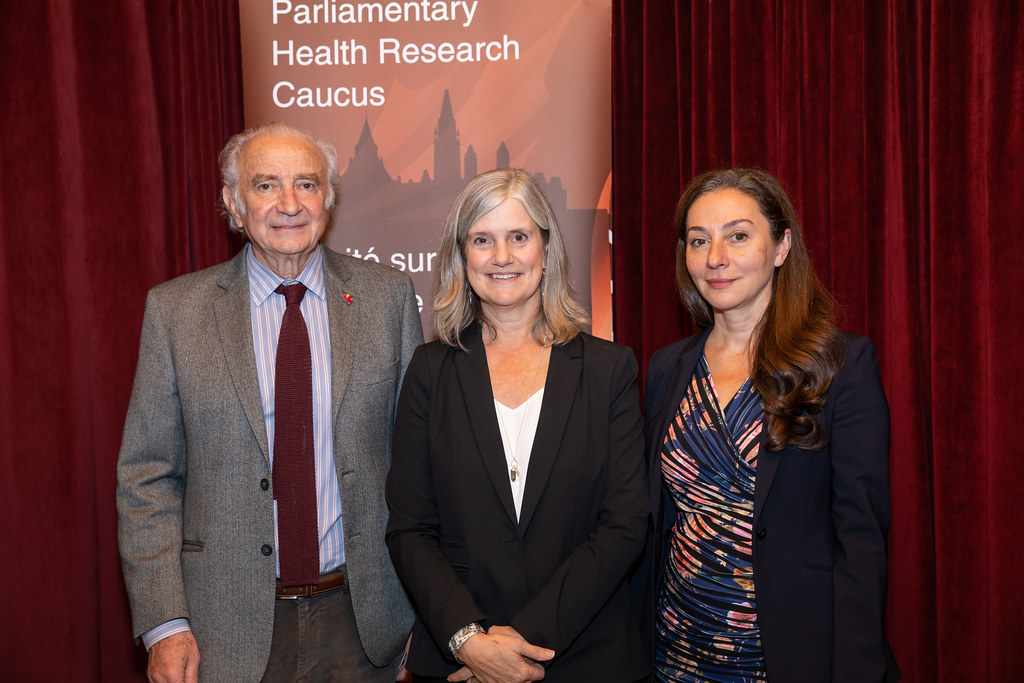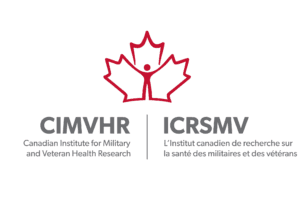Celebrating the 2023 Gairdner Awards Luncheon


Tuesday, October 24, 2023
12:00 p.m. – 1:30 p.m.
In Person in Ottawa, ON
This event is by invitation only.
Special Luncheon hosted by the Parliamentary Health Research Caucus, Research Canada, and the Gairdner Foundation.
The Canada Gairdner Awards celebrate the world’s best biomedical and global health researchers. The Gairdner Foundation was established in 1957 with the main goal of recognizing and rewarding international excellence in fundamental research that impacts human health. Annually, eight awards are given: five Canada Gairdner International Awards for biomedical research, one John Dirks Canada Gairdner Global Health Award, specifically for impact on global health issues, and two Canada Gairdner Momentum Awards, recognizing mid-career Canadian investigators. More than four hundred awards have been bestowed on laureates from 40 countries and of those awardees; 96 have gone on to receive Nobel Prizes.
Special Guests
 Dr. Gelareh Zadeh, M.D., Ph.D., FRCS(C), FAANS
Dr. Gelareh Zadeh, M.D., Ph.D., FRCS(C), FAANS
Professor and Neurosurgery Division Chair, Dan Family Chair in Neurosurgery, Wilkins Family Chair in Brain Tumor Research, Department of Surgery, Temerty Faculty of Medicine, University of Toronto; Head, Division of Neurosurgery, Toronto Western Hospital, Sprott Department of Surgery, University Health Network; Co-Director, Krembil Brain Institute, University Health Network; Senior Scientist, Princess Margaret Cancer Centre, University Health Network
Awarded “For advancing the molecular and genomic understanding of brain tumours, leading to better ways of discriminating, classifying and managing brain tumour subtypes with potential to transform the clinical care of the disease.”
The Work: Dr. Gelareh Zadeh is a neurosurgeon and senior scientist who combines her in-depth clinical knowledge of brain cancer with clinical and translational research to improve the diagnosis and management of adult brain tumours. Dr. Zadeh’s research program applies advanced genomic and epigenomic profiling to further our understanding of the molecular regulators of brain tumours and to develop tools that can refine biomarkers of diagnosis to predict treatment responses and ultimately, improve patient outcomes.
Dr. Zadeh’s research focuses on advancing knowledge of brain tumours through integration of multiple platforms of genomic analysis. This includes her research incorporating the largest-ever data analysis of meningiomas—the most common type of brain tumour, which has limited treatment options. She co-founded and leads the International Consortium on Meningiomas (ICOM), which provides researchers around the world with access to meningioma samples and data sets, as well as research expertise and collaborations. ICOM also helps to raise awareness of the importance of research funding into this disease. Dr. Zadeh’s discoveries in this field have led to new classification criteria that are biologically and clinically relevant, with the potential to outperform the current standard classification system developed by the World Health Organization. Specifically, her research has shown that meningiomas can be classified into four molecular groups, which reveals biological insights into how the cancer behaves. Using molecular features that reflect tumour behavior, the new classification criteria more accurately predicts cancer recurrence. Dr. Zadeh’s lab has also produced a comprehensive body of work on neuronal tumours, including schwannomas and peripheral nerve tumours. By performing the first integrated molecular analysis of schwannomas, her group established the genomic and epigenomic road map for sporadic and neurofibromatosis type 2 (NF2)-related schwannomas and identified a novel fusion protein that can be used for diagnostic, prognostic and therapeutic benefit. Similarly, Dr. Zadeh’s research has shown that the transformation of benign neuronal tumours to malignant cancers occurs via two independent molecular pathways, both of which can be therapeutically targeted. Another key contribution of her work has demonstrated the utility of plasma-based biomarkers for diagnosis, discrimination and determination of response to treatment, for a wide variety of brain tumours.
The Impact: Dr. Zadeh exemplifies an extraordinary commitment to advancing our understanding of brain tumour biology to improve patient outcomes. Her team has made significant strides in understanding how molecular features influence tumour management and has identified novel approaches to reduce the negative side effects of brain tumour treatments. Additionally, her team has identified plasma biomarkers that can help to diagnose intracranial tumours, predict treatment response and detect early recurrence, as well as potential drugs to treat malignant brain tumours. Her work is having a considerable impact in the diagnosis and clinical management of brain tumours and is giving hope to individuals affected by brain cancer.
 Dr. Jose Belizan, M.D., Ph.D.
Dr. Jose Belizan, M.D., Ph.D.
Senior Scientist, Department of Research in Maternal and Child Health, Institute for Clinical Effectiveness and Health Policy (IECS) Argentina; Superior Researcher at the National Scientific and Technical Research Council of Argentina (CONICET); Researcher, Bone Biology Laboratory, School of Medicine, University of Rosario, Argentina.
Awarded “For the development of innovative, evidence-based and low-cost global interventions in maternal and child health during the perinatal period that improve wellbeing and care during pregnancy, reduce morbidity and mortality, and promote equity in vulnerable populations.”
The Work: Dr. José Belizán is a trailblazer in the field of maternal and child health research in Latin America and internationally, focused on the perinatal period and its relevance to community health and the life cycle. His work spans basic research to international clinical studies, demonstrating the full cycle of scientific effort and leading to innovative, evidence-based and low-cost interventions. These interventions promote equity by improving maternal and child health in vulnerable populations. Through his work within these communities, he educates and empowers pregnant people, and witnesses real life health problems, which informs his outstanding scientific contributions.
Dr. Belizán discovered the connection between calcium intake and a decrease in the risk of hypertensive disorders of pregnancy (HDP) by observing Guatemalan Mayan women, where the prevalence of HDP was low, and their traditional cooking methods. Taking his observations further, he led numerous animal and human studies to confirm the association and basic studies to explain the mechanisms. He then planned and implemented international clinical trials in underdeveloped and developed country settings, which led to policy formulations at the highest international level and grassroots efforts to improve adherence to these guidelines.
This is just one of many examples of his extensive and comprehensive work to improve the wellbeing and care of people during pregnancy and interventions to reduce severe maternal morbidity and mortality. Dr. Belizán was the first to document, as well as design, test and implement landmark interventions addressing the issue of unnecessary increased use of Caesarean section. This is a complex and multifactorial challenge affecting not only high-income but also low- and middle-income countries, where associated risks can extend many years beyond delivery and are higher in those with limited access to comprehensive obstetric care. His research has also led to the decrease in unnecessary routine episiotomy worldwide, including in Canada and the US.
The Impact: Dr. Belizán has undoubtedly improved maternal and childbirth outcomes and made a difference in the lives of pregnant people and their children. His discovery of the importance of calcium intake alone has significant potential as three billion people lack access to adequate calcium intake worldwide. Reaching the scientific community, health systems decision-makers, international organizations, practitioners, health-care providers and local communities, he has overturned practices, introduced more effective and equitable practices, and spearheaded global policies that will contribute to more equitable societies. His work has informed various World Health Organization recommendations, which have been adopted by many countries around the world. Dr. Belizán goes above and beyond, ensuring that these best practices are known and used at the community level.
As an international expert, Belizán’s innovation and rigorous research from basic science to implementation has had a profound impact on global health and motivated researchers’ careers and actions worldwide over the last five decades. His work has sparked and will continue to lead to important developments in this sector as he demonstrates the importance of representation from low- and middle-income countries in global health research.






